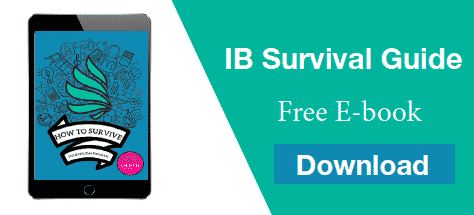We’ve all had that problem. We’re sitting in a lesson. We’re following what the teacher is saying. But there’s something that we just can’t get our head around. The binomial distribution maybe, or Plato’s Theory of Forms. We try to reread what we’ve just written in our notes. We think it through and… blank. It’s just not making sense. By the time we focus back on the lesson, the class has moved on. We now feel a little like this:
https://www.instagram.com/p/BqeuL-dnJp0/
What I’m talking about is a very common problem, but it’s hard to avoid in a typical classroom setting.
All of us learn at different speeds and think in different ways. So something that might seem clear as a bottle of Evian to one person might look as muddy and senseless as a puddle of rainwater to someone else. In the IB Diploma, where each student learns 6 very different subjects, it’s even more inevitable that we’ll be faster at learning some subjects than others.
But what can we do about this problem? How can we find the missing pieces? Keep reading for my top 3 tips on how to master the IB…
1. Keep Track of the Gaps
The first step to filling in all knowledge gaps in a subject is to keep track of each gap. Every time you realise something isn’t sticking in your brain, make sure you at least remember that it exists. Because, trust me, I know it’s tempting to just block the hard things out of your memory, but the fact is you have to understand everything to get the highest marks.
To keep track of the gaps you can:
- Colour-code your notes and highlight anything you don’t understand.
- Keep a checklist of all these things, and keep the checklist accessible or better yet visible!
- Even better, add them straight to a To-Do list of ‘things I’m going to learn’.
Stop thinking of the gaps as things you don’t understand. Instead, think of them as things you’re going to understand!

2. Take Time to Fill in the Knowledge
Often, when a topic feels impossible, there are actually just a few specific things that you don’t understand. This is especially true in subjects like Maths, where each step has to build on the one that came before it.
The only way to make sure everything is understood is to take time to go through the subject outside of lessons.
- Work on the problem by yourself with the textbook (and some chocolate) next to you.
- Ask a friend, teacher or an older sibling to explain it to you.
- Alternatively you could get a Lanterna tutor who can help support your studies.
Whatever you do, make sure you set aside extra time as part of your regular schedule so you know you are always staying on top of the work. Treat each knowledge gap as an individual problem and fix them one by one, starting with the simplest thing first. If you have that checklist, go through it and tick it off as you go.
3. Mastery Learning
Mastery learning is a strategy where students must have mastered each topic or concept before they move on to learn something else. In other words, studying goes at the student’s pace, and no topic is finished until that student understands it. You can read more about mastery learning here.
Even though this is hard to achieve in a classroom, it is possible if you are studying by yourself or with one-on-one tuition. In fact a 1984 study by Benjamin Bloom looked into this method of teaching and found that students who had received individual mentorship performed better in tests than those who had only been taught in bigger classes. Not just a little better, but 98% better – wow!
So, this is another solution to the knowledge gap problem we’ve been talking about. Individual tuition is becoming more and more common, and online platforms are allowing one-on-one mentorship to reach all over the world.
If you feel like you could benefit from mastery learning and would like support from mentors and tutors who know all about how to master your IB studies, have a look at our latest online private tuition packages to see if it might be for you!
But whether you choose to give yourself extra support or to work on it by yourself, remember to give yourself the time you need to succeed. Just learning one new thing every week will make a big different in the long-term, helping you to master the IB!
READ: What to do if you’ve been procrastinating on your Extended Essay all summer




